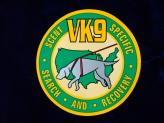So interested in seeing if you can make the cut?
Whether you and your dog have the drive, heart, and will to succeed in this field?
Great! We welcome anyone who is serious about their work and want to be the best they can. Standards are high for both dog and handler.
There are several questions you have to ask yourself:
1) Do you have the time to commit to this? If you have young children or a demanding job that requires a lot of your time then this is probably not the field for you. This work involves a serious long-term commitment to your dog and training. Your family must be supportive of this endeavor because you will need their help.
2) Do you have the financial ability to undertake this commitment? Search gear, gas, equipment, and vet care are not free. It takes money. Most spend thousands of dollars a year to cover expenses. Also, while many trainings do take place locally there are always seminars to attend as well as trainings in remote areas that offer unique situations to make for a well-rounded search team. Are you willing to travel outside the area to get the training you need or further your education?
3) Are you an outdoorsy-type of individual? Are you willing to put up with conditions that are uncomfortable or physically demanding? We train in all weather and under all conditions, as well as at night. Rarely do you get to select the condition under which you are tasked to search. Many requests come when it appears to be the worst weather for it so we train in them too. Also accept that you will meet spiders, ticks, snakes, and other wildlife during training and/or searches.
4) Are you physically fit? This work involves lots of walking, bending, carrying weight, climbing or negotiating a variety of terrains and situations. Individuals must be flexible, and able to use both hands. A quick test to see how fit you are is to be able to walk a mile in less then 20 minutes.
5) Mental Outlook? Must have a positive mental attitude and the ability to handle constructive criticism as well as able to self-evaluate your own capabilities and that of your dog.
And for the dog:
While not necessary to have a dog to begin learning this field, if you already have one here are some questions:
1) Is the dog alert and active? This is not the job for Couch Potato Dog. Most SAR dogs are active and working for 8-12 hours at a time. Dogs should be naturally curious and interested in their surroundings and very investigative.
2) Is the dog sound, healthy, and structurally correct? This work is physically demanding on the dog. Dogs with elbow, back, and hip problems as well as breathing problems or in physical distress with exertion need not apply. Dogs need to be at the appropriate weight for their breed and physical size.
3) Is the dog mentally stable and unafraid of loud noises or strange situations? If the dog is overly cautious when in new places or hesitant to approach strangers or have strangers around them, then this is not the job for them.
4) Is the dog motivated to hunt or search for scent with their human partner? If the dog is not predisposed to hunt or work then you cannot make them do so with any reliability. This field involves work, and a lot of it. A dog has to enjoy what they are doing.
5) Is your dog aggressive around people or other animals? A dog that poses a risk to biting humans or attacking other animals is not suitable in search and rescue.
There are a wide variety of dog breeds that were developed with specific needs in mind. While many dogs can be successful in this field most are either purebred or mixes from the Herding, Working, or Sporting groups. Dogs that are brachycephalic or that have a foreshortened muzzle ( example: boxers, bulldogs, and many of the toy breeds) are not good candidates due to the reduction of their scenting ability based on loss of nasal space as well as breathing concerns when the dog is working.
Some books you might want to read are:
“On The Trail” by Jan Tweedie
“Practical Scent Dog Training” by Lue Button
This will give you further insight into this fascinating and physically demanding work. The below links can also help you determine if you or your dog are right for this work. These assessments are NOT meant to be the sole determination if SAR is right for you but they can provide some helpful insight into the demands of this field.
If you are still interested and would like more information then contact:
Sarah Platts at 757-339-1902 or
Julie Jones at 207-735-4350 or


